- Home
- Kim Newman
Gaslight Arcanum: Uncanny Tales of Sherlock Holmes Page 5
Gaslight Arcanum: Uncanny Tales of Sherlock Holmes Read online
Page 5
I took the cloth from his hands and wiped the residue of soap off my face as he waited for my answer.
We played four hundred games of chess, and a thousand games of cards. He taught me every intricacy of luck and chance, and every statistic that disproves every superstition. He dissected every belief like a pinned-out frog, occasionally making it kick for demonstration purposes, then revealing how the effect was achieved. He knew the machineries of life and mind and held them in his head like railway timetables. He revealed to me the foolishness of crowds and the absurdities of love, the fallacies of poor thinking, and the whirring cogs of the criminal mind. My old education was over and my real education begun: my training to be the outsider, observing life but not being in its thrall.
We argued over Hegel’s Logik, observed by the beady eye of a parrot named Griswold. We pored over Giovanni Battista Morgagni, and Taylor’s seminal work on pathology and toxicology, the first in the English language.
We read by lamp light. We slept on the floor or in our chairs but more often talked through the night.
When we were busy, and the doors bolted so we would not be disturbed, food and drink was lowered on a rope through a trap door from upstairs by the loyal servant Le Bon.
I was made to memorize a hundred imprints of soles of shoes. And a hundred types of house brick. Coins. Coral. Types of dentition. Birds’ eggs. Navigational equipment. Moths.
Blindfolded, I learned how to identify cigarette brands by smell alone.
The nature of breeds of dog — not to mention their owners.
He would show me a hundred Daguerrotypes and direct me to deduce the maladies from the patients’ photographs alone. And more. More, more, he taunted me. What more do you see?
Hour after hour, day after day, the room became clearer, as if a veil were lifted. As if my eyes had been put through a pencil sharpener. As if the world, muddy and intangible, were slowly being made clean and whole.
Habitually we would visit the aforementioned Ménagerie, and always pay a special pilgrimage to the old Orangutan named — I remember it clearly — Bobo.
Sometimes, after supper, as we walked beside the Seine, Poe took my arm. He liked a stroll, but sometimes his vanity meant he left his walking cane at home. He would tell me not to nag him when I reminded him of the fact. Often we sat on a certain bench and gazed at the Moon reflected on the water.
Watson spoke in derogatory fashion of my lack of knowledge in the field of astronomy. The truth is, I know not too little, but too much.
Poe taught me to listen to the music of the spheres.
Giordano Bruno said there is no absolute up or down, as Aristotle taught; no absolute position in space; but the position of a body is relative to that of other bodies. Everywhere there is incessant relative change in position throughout the universe, and the observer is always at the centre of things.
The observer. The detective.
I spent three years with Poe before he died and he taught me — not “all I know” (such a claim would be absurd) — but how to know. He was no less than a father to me, and the only thing he ever asked in return is that I keep his secret from the world.
We were sometimes seen around Paris: C. Auguste Dupin, with his white hair, black cape and yellow sunglasses, and his young English assistant.
Some mysteries were solved.
The affair of the so-called “phantom” of the Paris Opera. The case of the horla and its tragically afflicted seer. The “crying spider” of Odilon Redon.
We applied arithmetic to decadence and catacombs.
I never resumed my studies at Cambridge. My university was that of Poe: of detection, and of life.
As he became frail I cared for him in that and another apartment, smaller, but with a view of the Bois du Boulogne.
He observed life from the window. We tested each other in deducing the characteristics of walkers on a Sunday afternoon. He’d bemoan my pipe tobacco. I’d in return call him a pious ex-drunk.
When his eyesight went, I read to him aloud. I remember all too well his reaction to Notre Dame de Paris by Victor Hugo. The tragic fate of Quasimodo made him grimace with emotion. I thought he had been moved by the fates of the hunchback and Esmeralda, but he quickly retorted it would have been better in verse … and shorter. Though he muttered that it was obviously influenced by his own Hop Frog — and most inferior to it.
He was cantankerous and conceited, vain as a poodle and unmelodious to the ear. But I have never known a more intelligent or electric individual, which almost always excused his inveterate rudeness and dire fluctuations of mood.
Most of all, I owe him my vocation. Sherlock Holmes — detective. What would I have become, else?
It will be a surprise to no one that my friend had a fear of being buried alive, and therefore stipulated in his will that the examining doctor open a vein in his neck to ensure no such ghastly mistake could be made. In the event the medic was all thumbs I had to perform his final wish myself.
Thinking of the grave in far-off Baltimore and its false incumbent, I watched the smoke rise from the Paris crematorium in a black plume.
The bird of death was silent at last, the black fading to white, the book of grotesquerie and wonder closed, the coffin breath exhaled, the great, unfathomable mind becalmed and untormented at last. He exists now only on every bookshelf in England, and in my final thoughts.
As I now lie close to death myself, I know more clearly than ever what my master — the master — knew: that Nature is chaos. Chaos is truth. Death is the final mystery. And our only defence is knowledge.
Infinite knowledge. Infinite, and futile, knowledge.
* * * * *
STEPHEN VOLK was recently nominated for both the Shirley Jackson and British Fantasy Award for his novella Vardoger. His writing has appeared in Year’s Best Fantasy and Horror, Best British Mysteries, Best New Horror and Gaslight Grotesque. Stephen is the creator/writer of the series Afterlife and Ghostwatch as well as many other film and television projects. The Society of Fantastic Films awarded him their International Award for contributions to the genre.
“The Adventure of Lucifer’s Footprints” by Christopher Fowler
Illustration by Luke Eidenschink
The Adventure of Lucifer’s Footprints
by Christopher Fowler
I must say from the outset that the shocking business of Lucifer’s footprints is something I cannot fully explain. And although there was a solution of sorts, it caused a rift between myself and my old friend that may never be fully healed. To this day, it chills me to the marrow to think of our foray into the dark netherworld that lies beyond the reach of rational science.
I have written elsewhere that although I recall the events laid out herein, I cannot place an exact date upon them, for I was not long married when I came to call upon Holmes once more.
I do remember the gutters of Baker Street running with melted ice and snow, the sky a sickly winter yellow above the chimney pots, which tempts me to place my visit on a Saturday in the late February of 1888. Should I venture to the vaults of the bank of Cox & Co., Charing Cross, and unearth my battered tin dispatch box, I would find among the many papers some notes which might be constructed into an account of what happened during our time in Devon. But I can still barely bring myself to believe what happened. And indeed, there is no logical explanation — I can only set down the facts as they occurred.
It began, as these things so often did, with a visitor to Holmes’ rooms.
“This is really most inconvenient,” said my friend when he heard the doorbell and peered down from his front window.
“You don’t know there is a caller for you,” I ventured, for it is true that my friend’s suppositions sometimes seemed to me a little glib.
“Mrs. Hudson does not take calls at this time,” he replied briskly. “The butcher’s boy is not due this morning, and the lady standing on the step is dressed in a style of finery that was at its height in London two years ago,
which suggests she is up from the country — not a social call, for she would visit her milliner first, but a matter of urgent business.”
Moments later the door opened and Mrs. Hudson requested to speak with Holmes. “Sir, there is a lady for you who will not be put off,” she said. “I have asked her to wait—”
“Mr. Holmes, you are a consulting detective, are you not, and as such I should be able to call upon you as I would a doctor?” said the lady, coming into the room and removing her gloves.
“I have said as much myself, Miss—”
“Woodham, Lucy Woodham,” said the lady, as forthright as she was pretty.
“Please Madam, take a seat and pray tell me what I can do for you. This is Dr. Watson, a trusted friend and confidant. You may speak freely in front of him.”
I have travelled up from Devon today to see you because you came highly recommended to me by Miss A---, for whom you handled a most delicate matter,” she began. “My father is Major General Sir Henry Woodham.”
“A most valorous gentleman, Miss Woodham,” said Holmes, impressed. “A favorite of Her Majesty’s, I believe.”
“Indeed, sir, although you might not credit it to see him now, for he is a broken man.”
“Why so?”
“It began three months ago, when the footprints first appeared. And it has recently culminated in death and madness.”
I saw the sparkle in Holmes’ eyes and felt his excitement like electricity in the room. He knew the game was afoot. “Please be seated and tell me more, starting at the beginning,” he said.
“My father retired from the military world, but found life hard to adapt to at Belstowe Grange,” Miss Woodham explained. “He inherited the property from his grandfather, and upon his retirement we moved from Worcestershire to Devon, hoping to restore the house to its former glory. It wasn’t long before we heard the stories.”
“What stories?”
“You must understand that Belstowe Down is a close community, Mr. Holmes. It centres around the rows of villagers’ cottages, the parish church and the grange. It is quite ancient. There was supposed to have been a Roman encampment at the site. Storms often wash away the roads, keeping the village isolated and its residents prone to superstition. There is a legend that says when a terrible crime has been committed, the Devil sends his legions of the lost to take ghastly revenge upon the perpetrator.”
“And your villagers have recently had reason to believe this has once more come about.” Holmes tamped his pipe and sent aromatic blue clouds into the room. “Please describe the circumstances.”
“On Sunday afternoon the head groom and his stable boy had been returning the horses from exercise when a sudden storm arose. The sky blackened and the wind howled, bringing squalls of rain that hammered at the house and flooded the grounds. I and my father watched from inside the grange. When the tempest finally passed, the stable boy was discovered in a state of shock from which he has not recovered, and the groom was found lying in the middle of the lawn with his throat cut deep from ear to ear.” Miss Woodham paused, quite overcome with emotion, but gathered her wits and continued. “But that was not the worst of it.”
“What more could have happened?” I cried, feeling sorry for this fetching young lady who was clearly so distraught.
“I think we had better come directly to the grange with you to see for ourselves,” said Holmes.
A quick consultation of Bradshaw confirmed a train leaving within the hour. I suggested staying in the village inn, but Holmes felt it was wiser not to alert the local populace of our presence, and so took up Miss Woodham’s offer of rooms on her father’s estate.
The main body of the building at Belstowe Grange was Jacobean, wood-panelled, high-ceilinged and flagstone-floored, impossible to adequately heat and gloomy with shadows near the rafters. I imagined that Major General Sir Henry Woodham would be ‘the Very Model’ as Mr. Gilbert might say, ramrod-backed and stern of countenance. His illustrious military career spoke volumes, and yet the gentleman who greeted us was but a shade of his former self. His sallow skin hung loose upon his stooped bones, his eyes were dark with approaching shadows and he started at the slightest noise.
“I’m glad you could attend us, Mr. Holmes,” he said, shaking our hands with relief. “This is the most confounded business, and I am deuced if I know what the answer might be. I can only think that the villagers are right, and the Devil himself has cursed this place.”
“There is no time to be lost. Perhaps we should start by seeing your stable boy,” Holmes suggested. “Where is he now?”
“He is attended by a nurse upstairs,” said Miss Woodham, “but I fear you will discover little from him. The lad has not uttered a single word since witnessing the death of his master.”
Jacob, the stable boy, lay pinned by hard white linens in a small room at the back of the house. His pale face stared straight up, his eyes unmoving, his lips dry. Holmes sat beside him while I shone a light in the lad’s eyes to measure the contraction of his pupils. “He is in shock,” I told the nurse. “He must be regularly fed beef tea and kept warm. In time he will make a full recovery.”
Holmes was talking to the lad, speaking so quickly and softly that none of us could hear what he was saying. After a few minutes, the boy’s mouth suddenly opened and he began to whisper the same thing over and over, something that sounded like ‘Phantoms of the dead.’
“I fear we will get no more from him today,” said Holmes, rising sharply. He seemed hardly concerned for the boy’s health, and only wanted more information. “Come, Watson, we need to see the body of the groom. Perhaps Dr. Watson might be allowed to examine him?”
“He is lying upstairs in the Barley Mow, awaiting the verdict of the coroner,” Miss Woodham explained. “Mr. Charlton can take you to him in the brougham.”
A short, barrel-chested man with luxuriant grey mutton chop whiskers and the sun-darkened face of an outdoorsman appeared beside the Major General.
“Mr. Charlton can be trusted with anything you might have to say,” said Sir Henry. “Like myself, he was a cavalry officer at the Crimean Peninsula. I have known him for well over thirty years. Many in our village fought for their country, but few were actively engaged with the enemy like Charles and myself.”
We made our way through scowling drinkers and climbed the worn stairs in the local alehouse, where we found the body of Elias Peason, the head groom, covered with a winding sheet that had grown dark with his blood. I removed the cloth and studied the wound at his throat. “This cut was not made with a razor,” I exclaimed, “but with a sword. It is too wide and deep, and was performed in a single sweep.”
“Bravo, Watson,” Holmes exclaimed. “I knew I could rely upon your medical knowledge to help us out. But regard the look of sheer horror on his face. What did he see in the moment of his death?” He turned his attention to Mr. Charlton. “Were the pair of them together throughout the course of the storm?”
“I am given to understand so. They were seen from the road by a passing ostler who insists that the boy ran off at the height of the storm, leaving his master alone.”
“He saw the groom die?”
“He says the man uttered an unearthly scream and fell to the ground, and that he was entirely alone.”
“You know this witness? He is reliable?”
“He is known to partake of strong drink upon occasion.”
“Do you have any reason to suspect the lad?”
“Not at all. He had the greatest respect for his master. You will see for yourself, sir. There is fear in his face, but no cruelty in his heart. During my time in the army I have seen men kill and be killed in turn, and I would swear the boy is innocent.”
“Then whom do you suspect?”
“I think you had better see the rest of it, sir,” said Mr. Charlton, bringing us to the lawn where the body was found.
The half-acre of green behind the grange was still flooded from the storm. Around us the tops of tall beeches s
hook and whispered as if telling secrets. As we approached the spot where the groom had been killed, Holmes strode forward with a look of excitement on his face. Almost at once I saw what he saw, but could not make sense of it. “What is that?” I asked.
There appeared to be hundreds of indentations surrounding the space where the body had fallen. The earth was as churned and broken as if a flight of stallions had been driven across it.
“Did the groom release your horses before he was attacked?” asked Holmes.
“No sir, these prints were not here before,” said Mr. Charlton. “The horses were affrighted in the storm, but were still stabled behind locked doors.”
“The prints appear to start at the edge of the lawn and lift away on the far side,” called Holmes. “There are no other marks beyond them. It’s almost as if they came down from the sky to attack the groom.”
“Whatever could have left so many hoof prints?” I asked, but no answer came.
“We have found them here before, sir, regularly for the last three months, sometimes numbering in their hundreds, cutting across the fields in a single flight.”
“There are no herds of wild horses in the area?”
“Not to my knowledge, sir, not since the grazing lands were fenced.”
“When was the last time the prints appeared?” asked Holmes.
“Two weeks ago to the day, sir.”
“And before that?”
“The Saturday previous, just after dark.”
“That is suggestive,” Holmes replied, but I could not see how.
Later that evening we joined Sir Henry and his daughter in the candlelit retiring room after dinner. Usually by this stage Holmes had a rough idea of what he was up against, but this time he remained uncharacteristically silent on the cause.
“Did your groom have any enemies?” he asked, stroking his thin nose thoughtfully. It was the kind of elementary question he usually had no need of raising.

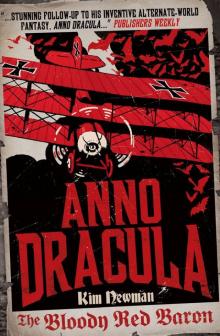 The Bloody Red Baron
The Bloody Red Baron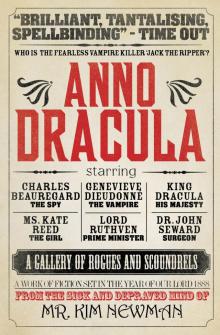 Anno Dracula
Anno Dracula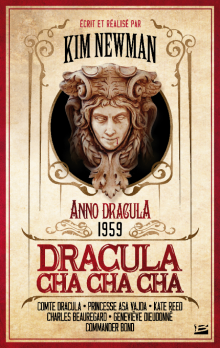 Dracula Cha Cha Cha
Dracula Cha Cha Cha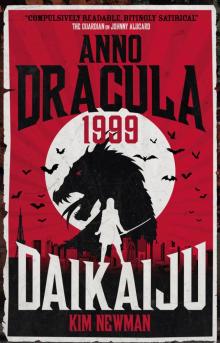 Anno Dracula 1999
Anno Dracula 1999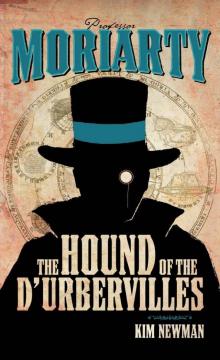 Moriarty: The Hound of the D'Urbervilles
Moriarty: The Hound of the D'Urbervilles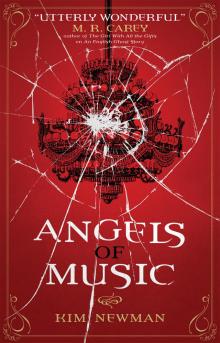 Angels of Music
Angels of Music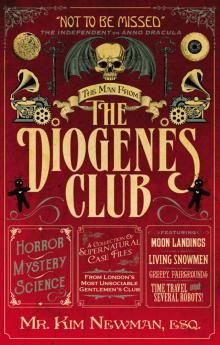 The Man From the Diogenes Club
The Man From the Diogenes Club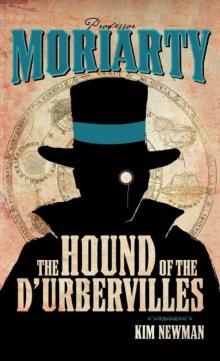 Professor Moriarty: The Hound Of The D’urbervilles
Professor Moriarty: The Hound Of The D’urbervilles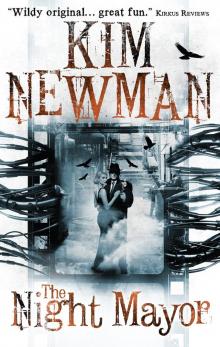 The Night Mayor
The Night Mayor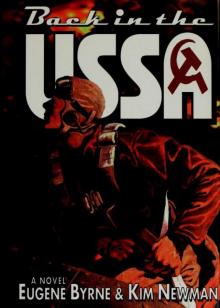 Back in the USSA
Back in the USSA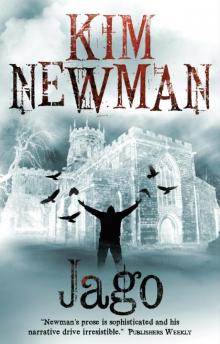 Jago
Jago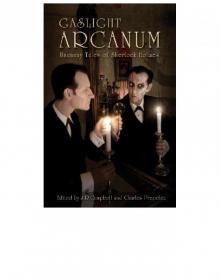 Gaslight Arcanum: Uncanny Tales of Sherlock Holmes
Gaslight Arcanum: Uncanny Tales of Sherlock Holmes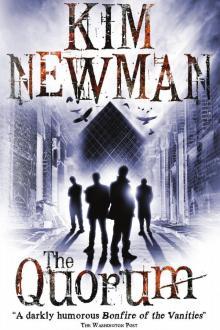 The Quorum
The Quorum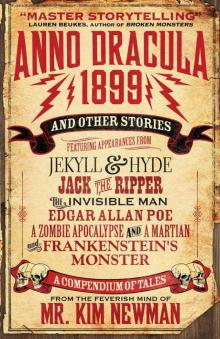 Anno Dracula 1899 and Other Stories
Anno Dracula 1899 and Other Stories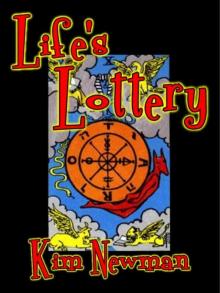 Life's Lottery
Life's Lottery The Secrets of Drearcliff Grange School
The Secrets of Drearcliff Grange School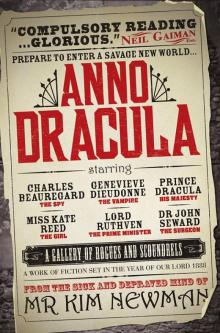 Anno Dracula ad-1
Anno Dracula ad-1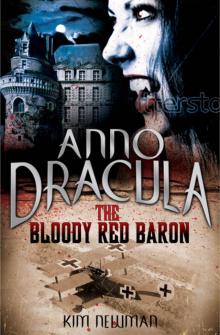 The Bloody Red Baron: 1918 ad-2
The Bloody Red Baron: 1918 ad-2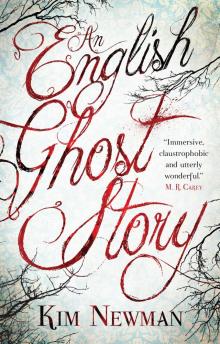 An English Ghost Story
An English Ghost Story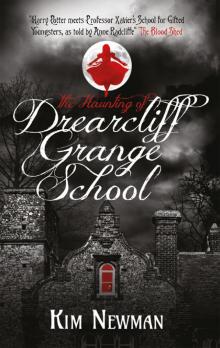 The Haunting of Drearcliff Grange School
The Haunting of Drearcliff Grange School The Other Side of Midnight
The Other Side of Midnight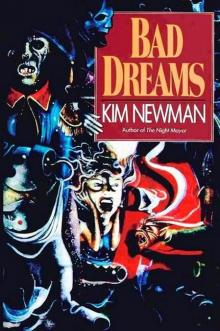 Bad Dreams
Bad Dreams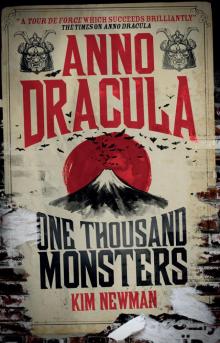 Anno Dracula--One Thousand Monsters
Anno Dracula--One Thousand Monsters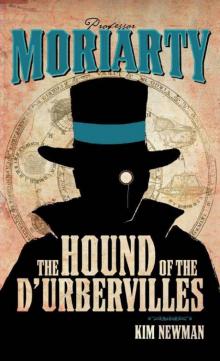 The Hound Of The D’urbervilles
The Hound Of The D’urbervilles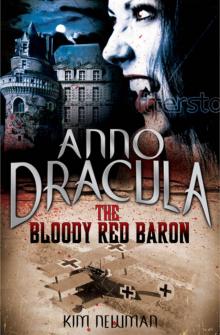 The Bloody Red Baron: Anno Dracula 1918
The Bloody Red Baron: Anno Dracula 1918